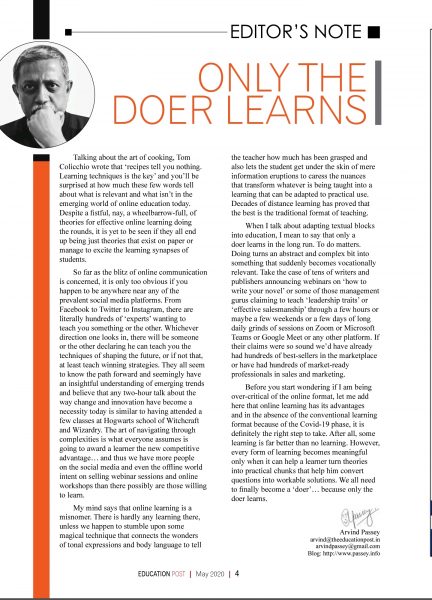Talking about the art of cooking, Tom Colicchio wrote that ‘recipes tell you nothing. Learning techniques is the key’ and you’ll be surprised at how much these few words tell about what is relevant and what isn’t in the emerging world of online education today. Despite a fistful, nay, a wheelbarrow-full, of theories for effective online learning doing the rounds, it is yet to be seen if they all end up being just theories that exist on paper or manage to excite the learning synapses of students.
So far as the blitz of online communication is concerned, it is only too obvious if you happen to be anywhere near any of the prevalent social media platforms. From Facebook to Twitter to Instagram, there are literally hundreds of ‘experts’ wanting to teach you something or the other. Whichever direction one looks in, there will be someone or the other declaring he can teach you the techniques of shaping the future, or if not that, at least teach winning strategies. They all seem to know the path forward and seemingly have an insightful understanding of emerging trends and believe that any two-hour talk about the way change and innovation have become a necessity today is similar to having attended a few classes at Hogwarts school of Witchcraft and Wizardry. The art of navigating through complexities is what everyone assumes is going to award a learner the new competitive advantage… and thus we have more people on the social media and even the offline world intent on selling webinar sessions and online workshops than there possibly are those willing to learn.
My mind says that online learning is a misnomer. There is hardly any learning there, unless we happen to stumble upon some magical technique that connects the wonders of tonal expressions and body language to tell the teacher how much has been grasped and also lets the student get under the skin of mere information eruptions to caress the nuances that transform whatever is being taught into a learning that can be adapted to practical use. Decades of distance learning has proved that the best is the traditional format of teaching.
When I talk about adapting textual blocks into education, I mean to say that only a doer learns in the long run. To do matters. Doing turns an abstract and complex bit into something that suddenly becomes vocationally relevant. Take the case of tens of writers and publishers announcing webinars on ‘how to write your novel’ or some of those management gurus claiming to teach ‘leadership traits’ or ‘effective salesmanship’ through a few hours or maybe a few weekends or a few days of long daily grinds of sessions on Zoom or Microsoft Teams or Google Meet or any other platform. If their claims were so sound we’d have already had hundreds of best-sellers in the marketplace or have had hundreds of market-ready professionals in sales and marketing.
Before you start wondering if I am being over-critical of the online format, let me add here that online learning has its advantages and in the absence of the conventional learning format because of the Covid-19 phase, it is definitely the right step to take. E-learning, with the help of dedicated elearning designer, has played a crucial role in ensuring that education remains accessible and effective during these challenging times. After all, some learning is far better than no learning. However, every form of learning becomes meaningful only when it can help a learner turn theories into practical chunks that help him convert questions into workable solutions. We all need to finally become a ‘doer’… because only the doer learns.
.
.
First published in Education Post as the editorial for May 2020…


.
.
Arvind Passey
07 June 2020








